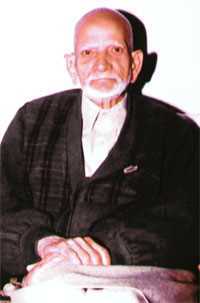OK, now lets come to the topic.
Shareef Kunjahi was one of the popular Poet and writer of Punjabi language. He was among the main workers of the Department of Punjabi Language at University of Punjab in 1970s and added to Punjabi writing as an artist, composition author, instructor, researcher, etymologist, word specialist and interpreter.

Shareef was born in 1915 in Kunjah, a residential area of Gujrat District in Punjab. Despite the fact that Shareef composed verse in both Urdu and Persian dialects, and even made a name as an Urdu writer very right off the bat in his composition profession, Punjabi was forever his first love. For a best in class Muslim poet of that period, particularly among the early dynamic scholars and artists, receiving Punjabi for his imaginative verbalization was an uncommon wonder.
He moved toward becoming among the pioneers of present day Punjabi verse from 1930s at about a similar time when Prof Mohan Singh presented common subjects and another style in Punjabi verse. His first accumulation of Punjabi Poetry Jagrate (restless evenings) was first distributed in Gurmukhi in East Punjab in 1958, and wasn't distributed in Shahmukhi in West Punjab until 1965. It contained just 37 sonnets. His next treasured poetry Orak Hondi Lou (diminishing light) was distributed in 1995.
Kunjahi's poetry is a total break from the qissa and Sufi conventions. Indeed, even his most punctual ballads have every one of the components of present day poetry: secularism, articulation of nonconformist experience, attention to social and political changes around him, and so forth.
His profound feeling of takeoff from the current esteem framework was communicated in a large number of his initial sonnets:
Today, I am will stroll past your town,
A place from where I was not ready to move away previously,
Where I generally was searching for some reason to go.
What pardon? Actually you were the genuine reason
Who had made that town a place for journey?
What a delightful name it had,
That it was so energizing to simply tune in to its name.
Taking a gander at its trees from a separation would take away all tiredness,
It appeared like their branches were giving me a flag to approach.
Remaining under their shadow was brilliant.
Today, I will stroll by those trees.
Nothing is pulling me towards them,
Neither do I feel the cherishing contact of breeze originating from your town
Nobody is there to meet me with friendship
Or on the other hand sitting tight for me,
Holing up behind the Kikkar trees, and alone
I am going by your town
As though it is a memorial park, not a town.
( Translation from his poetry collection 'Jagrate' )
A Great POET!!!